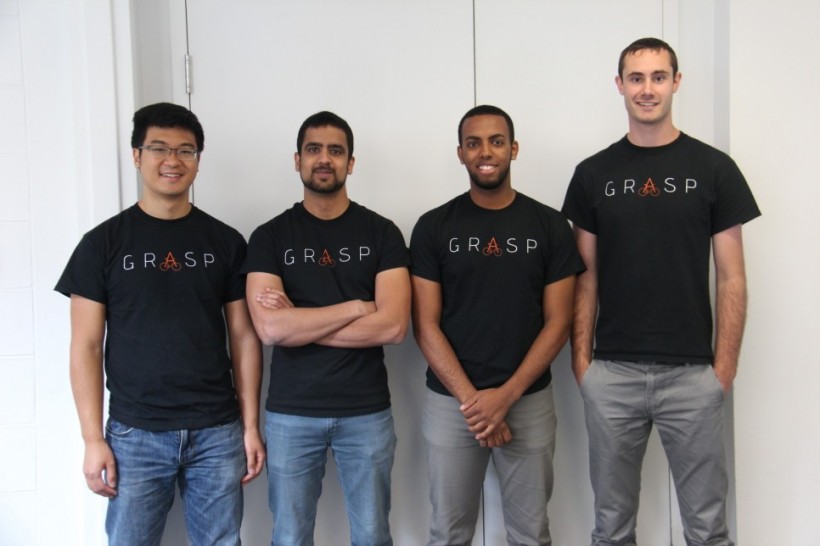To learn how to manufacture a keyless bicycle lock, the team from Grasp traveled 13,000 kilometres to the electronics manufacturing capital of the world.
Grasp is a Waterloo-based company that has prototyped a bike lock that opens by recognizing your fingerprints, rather than requiring keys or combinations. All you have to do is grasp the handle and the lock springs open – offering convenience and adding security as only the bike owner can open the lock.
Led by Co-Founders Sarbjeet Singh and Samson Berhane, the team was developing the product at the Velocity Foundry, the University of Waterloo’s hardware accelerator. But they decided they needed to learn more about mass-producing their product, so they traveled to Shenzhen, China, to attend Hax, one of the world’s leading hardware accelerators. They are among 80 companies from around the world working at the Chinese facility.
“The experience is pretty crazy,” said Singh in a recent phone interview from Shenzhen. “It’s given us the ability to iterate quickly. What Hax does is really help you to connect with mentors that can accelerate your pace of development.”
The story of Grasp began just months ago when Singh and Berhane were senior electrical engineering students at U of W. They both commuted to school on bike, and got sick of the hassle of constantly fiddling with their locks, especially during quick stops.
So for their fourth-year design project, they focused on creating a simple fingerprint-enabled mechanical lock. It is shaped the same as a U-Lock but uses a hinged arm that the rider grabs and moves to open the lock.
They conducted their customer discovery with other cyclists and they learned that their peers loved the convenience of the Grasp product.
When they graduated in the spring, they stuck with the project and worked on it at the Velocity Foundry. The difference in Shenzhen (a special economic zone adjacent to Hong Kong) was the speed with which the team can redesign, produce and test each new iteration of the lock.
“People greatly underestimate the amount of work required to make a product that could be mass manufactured,” said Singh. “There are many details outside of engineering that have to be ironed out, such as where all the components going to come from, how to get them to the factory, how do you assemble them, how do you ship to customers.”
The four team members of Grasp are nearing the end of their four-month stint at Hax. In the near future, they intend to launch their product through a Kickstarter campaign. But before that, the next big event for them is to pitch at the Hax demo day, which will take place in San Francisco on Nov. 10.
“This is where we will unveil the Grasp Lock and we’ll get our first real chance to see what the world thinks of the technology we have developed,” said Singh.










